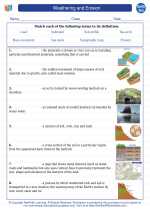Habitat Destruction and Fragmentation
Habitat Destruction: Habitat destruction refers to the process by which natural habitats are altered, degraded, or eliminated. This can occur due to various human activities such as deforestation, urbanization, mining, agriculture, and infrastructure development. As a result of habitat destruction, many plant and animal species lose their natural homes and are forced to either adapt to new environments or face extinction.
Causes of Habitat Destruction: Human activities are the primary drivers of habitat destruction. Some of the main causes include:
- Deforestation for timber, fuel, and agricultural expansion
- Urbanization and infrastructure development
- Mining and extraction of natural resources
- Pollution of land, water, and air
- Introduction of invasive species
Effects of Habitat Destruction: The consequences of habitat destruction are far-reaching and include:
- Loss of biodiversity and species extinction
- Disruption of ecological balance and food webs
- Reduced availability of natural resources
- Increased vulnerability to natural disasters
- Impact on indigenous and local communities
Fragmentation: Habitat fragmentation occurs when large, continuous habitats are divided into smaller, isolated patches. This process often results from human activities such as road construction, agricultural expansion, and urban development. Fragmentation can lead to habitat loss, increased edge effects, and reduced connectivity between different habitat patches.
Study Guide
Here are some key points to consider when studying habitat destruction and fragmentation:
- Define habitat destruction and provide examples of human activities that contribute to it.
- Explain the causes and consequences of habitat destruction on both wildlife and human populations.
- Discuss the concept of habitat fragmentation and its effects on biodiversity and ecosystem functioning.
- Explore potential solutions and strategies for mitigating habitat destruction and fragmentation, such as habitat restoration, conservation efforts, and sustainable land use practices.
- Examine case studies or real-life examples of habitat destruction and fragmentation in different regions of the world.
By understanding the complexities of habitat destruction and fragmentation, we can work towards preserving and restoring critical habitats for the benefit of all living organisms on Earth.
.◂Earth Science Worksheets and Study Guides High School. Weathering and Erosion
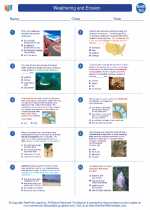
 Worksheet/Answer key
Worksheet/Answer key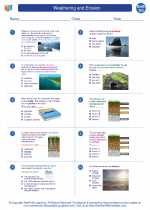
 Worksheet/Answer key
Worksheet/Answer key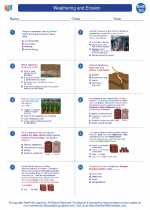
 Vocabulary/Answer key
Vocabulary/Answer key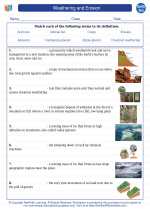
 Vocabulary/Answer key
Vocabulary/Answer key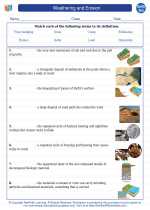
 Vocabulary/Answer key
Vocabulary/Answer key